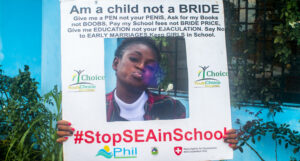Sexual And Reproductive Health Program
The Liberia Demographic Health Survey of 2013 states that, 3 out of every 10 girls are pregnant before the age of 19 years which contributes to the adolescent birth are of 177 for every 1000 live birth and teenage pregnancy rate of 31%.
Furthermore 60% of all mothers reported having baby by 19 years, while an estimated 30% of adolescent pregnancies end in abortion with 90% being risky pregnancy. In Liberia, 63% of women age 25–49 reported to have had sexual intercourse by age 15 and 78% by age 18. Young motherhood is seen more common in rural areas (42%) than urban areas (24%). Young people accounts for 37% of new HIV infection in Liberia. Interestingly, the high incidence of HIV infection among adolescents and young people is ttributed to high risk sexual behavior and their limited understanding about the risk associated with having unprotected sex and multiple sexual partners
To support government in reducing these poor statistics on the health status of young people in Liberia, PHIL has been working to improve youth sexual and reproductive health outcomes through its youth friendly health program called Youth Choice Initiative also known as Y-Choice. A flagship program to promote youth access to sexual and reproductive education, information and services in and out of school. Under this program PHIL has been engaged with 2768 youths in and out of school youth in Montserrado, Nimba, Bassa, Rivercess, Cape Mount, and Bong County respectively as well as 28 health facilities using a three prong approach strategy that comprehensively work to enhance effort of all actors working on the issues of adolescents access to comprehensive sexual and reproductive information services and commodities . Under the YChoice program PHIL is engaged in the peer to peer, community engagement and linking youth to health services using mobile clinic called the Y-Choice Market Place, see below more details on PHIL approach;
 Peer-to-Peer engagement– empowers young people through introduction of life skills and peer to-peer education so as to increase sexual and reproductive health knowledge and subsequently influence behavior towards a low-risk lifestyle through awareness raising on menstrual hygiene management, STIs and HIV as well as distribution of IEC materials and condoms. At the same time young people are provided skills to conduct advocacy on using human right based approach so as to change public perception, influence policy decisions and funding priorities for youth sexual and reproductive health services in Liberia
Peer-to-Peer engagement– empowers young people through introduction of life skills and peer to-peer education so as to increase sexual and reproductive health knowledge and subsequently influence behavior towards a low-risk lifestyle through awareness raising on menstrual hygiene management, STIs and HIV as well as distribution of IEC materials and condoms. At the same time young people are provided skills to conduct advocacy on using human right based approach so as to change public perception, influence policy decisions and funding priorities for youth sexual and reproductive health services in Liberia
Linking youth to health services using Mobile Clinic : The mobile clinic is called the Y- Choice market Place or Youth Market Place to provide comprehensive sexual and reproductive health services to as a one stop shop for young people to access information on Sexual and reproductive health services in terms of education, screening and treatment for STIs and referral The YChoice Market Place provides a comprehensive youth friendly sexual and reproductive health services at a targeted locations with movement schedules announce widely through the peer educators in and out of schools, as well as local community radios. The Y Choice vehicle is mounted with speakers and beautifully decorated with key messages on promoting access to sexual and reproductive health services for young people and works with peer educators to conduct health promotion activities. Additionally on the mobile clinic counseling services are provided, and health promotion including menstrual health and hygiene management for adolescent girls .
 Community engagement– under this component PHIL work to build community support through community mobilization and sensitization activities using existing community health structures of the Liberian health care system on sexual and reproductive health issues affecting young people, their consequences and actions needed to addressed it. Thereby changing communities perception about youth health, influence policy decision and advocate for increase funding to address health issues affecting young people. A variety of community communication channels, such as community theatre and radio networks, posters and other channels are used to promote awareness, share information and knowledge and prompt people to make informed decisions.
Community engagement– under this component PHIL work to build community support through community mobilization and sensitization activities using existing community health structures of the Liberian health care system on sexual and reproductive health issues affecting young people, their consequences and actions needed to addressed it. Thereby changing communities perception about youth health, influence policy decision and advocate for increase funding to address health issues affecting young people. A variety of community communication channels, such as community theatre and radio networks, posters and other channels are used to promote awareness, share information and knowledge and prompt people to make informed decisions.


